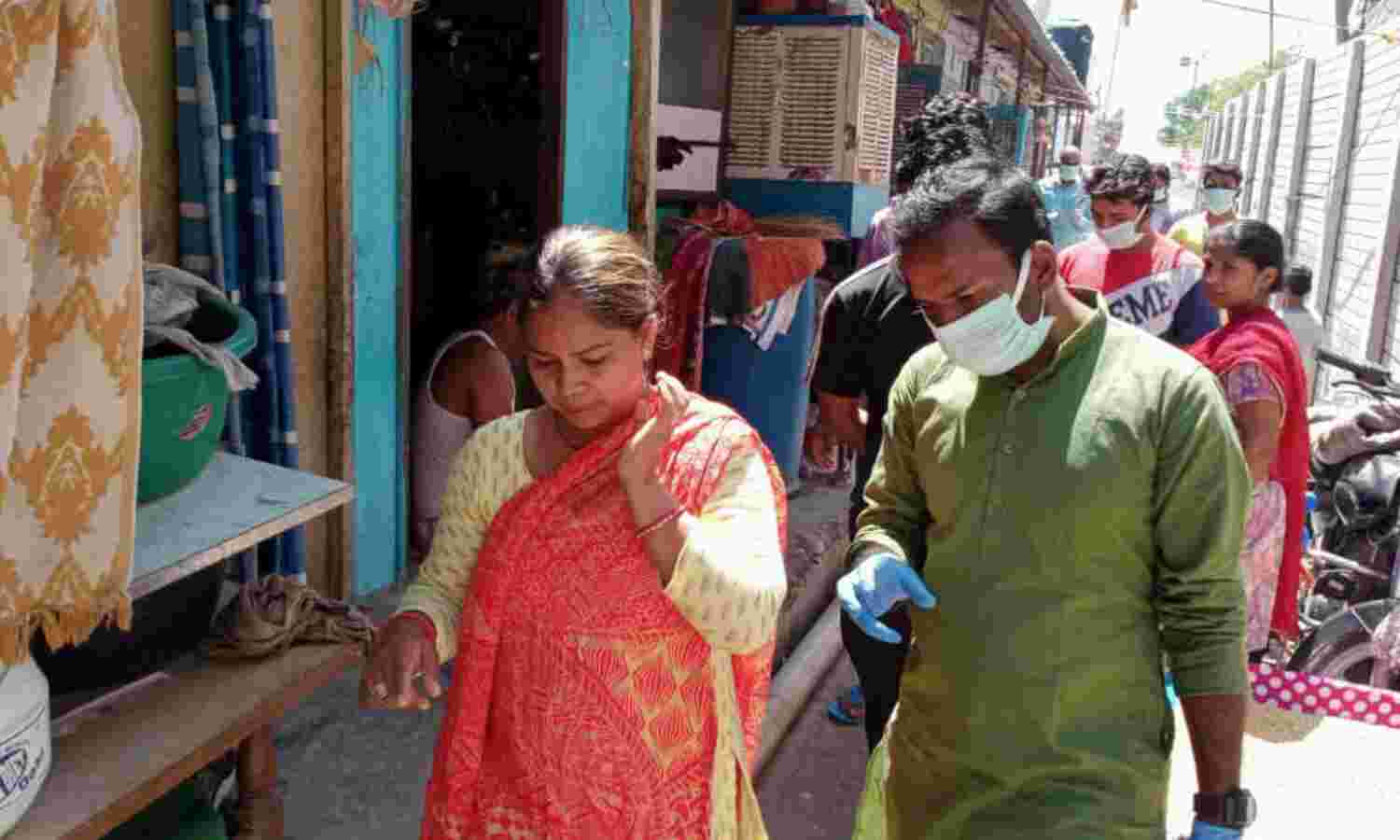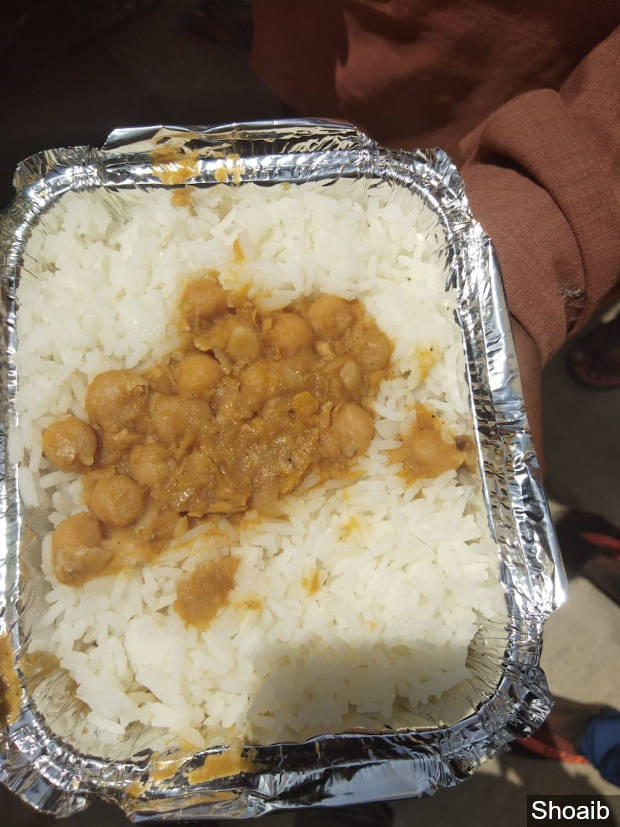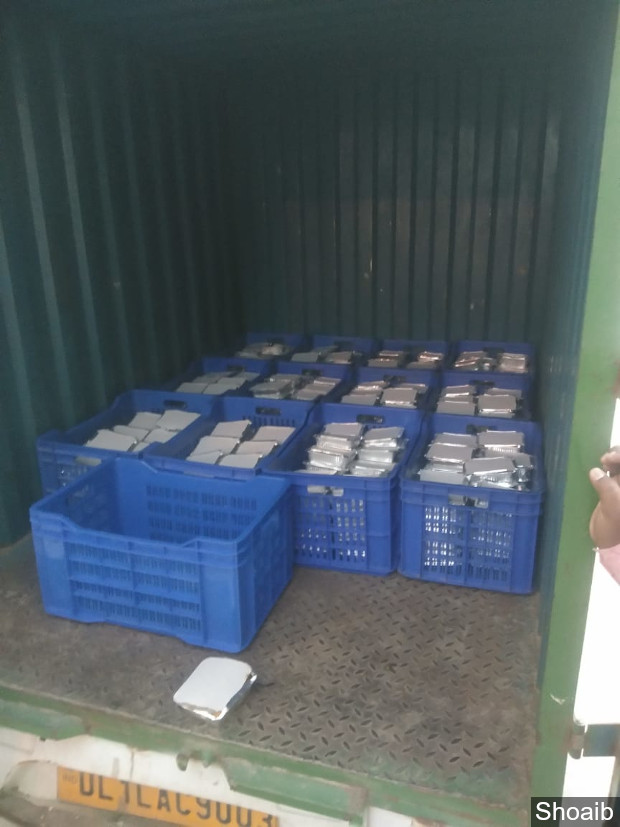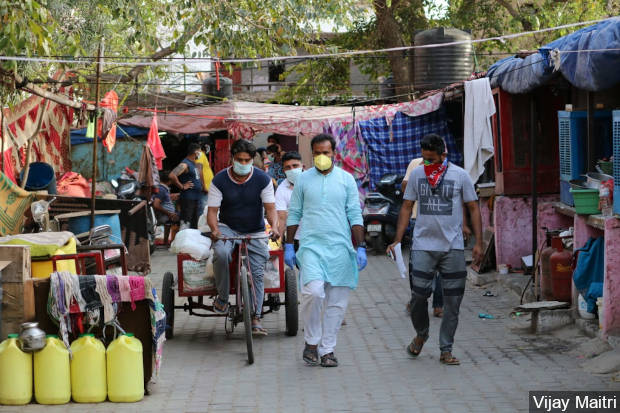COVID-19: Displaced & Out Of Work, Artistes Of Kathputli Colony Struggle For Two Meals

New Delhi: Master puppeteer Puran Bhatt is a Sangeet Natak Akademi Puraskar awardee. Today, the 66-year-old winner of India’s highest award for practicing artistes is under lockdown in a “transit camp” in west Delhi’s Anand Parbat, struggling to access ration for two meals a day.
“We are the kind of artistes who went out to work everyday, and bought our food with what we earned,” Bhatt told IndiaSpend, “Now our work is at a standstill, and there isn’t enough to eat.”
The transit camp’s residents were relocated to this overcrowded and insanitary camp--managed by the Delhi Development Authority (DDA) and Raheja Developers--from Kathputli Colony when the informal settlement of traditional performing artistes including puppeteers, dancers, acrobats, magicians, folk singers, musicians, and craftspersons, was demolished in 2017. Its sundry residents, who had also accreted there from the 1950s, and had performed before India’s presidents and prime ministers and taken their craft across continents, were moved to DDA flats in Narela, 30 km away.
Three years since they were displaced from their original homes, residents of the former Kathputli Colony relocated to Narela’s DDA flats are yet to get documents confirming their allotment because of procedural delays, 39-year-old Ajay Kumar Gupta, a father of four shifted to Narela, said. So, their identity documents, including ration cards, carry their old addresses, rendering them unable to access subsidised foodgrain that the government provides to the poor under its public distribution system (PDS).
This time of year would have been the lucrative wedding season, but the spread of COVID-19 has locked them out of their work, which essentially involves social gatherings or street crowds. Their already fragile incomes gone, they are facing hunger due to limited government support, and a few of them have appealed for donations through a crowdfunding portal.
With 2,800 families cramped together, each living in a one-room lodging made of lightweight aerocon panels and using community taps and toilets, the residents in the Anand Parbat camp also worry about being easy targets for the spread of COVID-19. “If one of us gets it, everyone will,” Bhatt said.
Artistes and craftspersons overlooked
While extending the lockdown to contain COVID-19 until May 3, 2020, Prime Minister Narendra Modi, in his television address on April 14, 2020, acknowledged the hardships it had caused, but did not outline a plan to alleviate them. “Take as much care of poor families as you can,” he said to well-off Indians, “Especially try to fulfil their food requirements.”
Millions of citizens with uncertain incomes continue to struggle to sustain--migrant factory workers, daily wage construction labour, as also traditional artistes and craftspeople. Apart from the appeals being sent out on behalf of the artistes from Kathputli Colony, there is at least one other aid campaign running on a crowdfunding portal for another set of India’s traditional performing artistes, the manganiyar musicians of Jaisalmer in Rajasthan.
India’s performing arts industry was worth Rs 23,600 crore ($4.3 billion) in 2012, according to a 2016 report by the Federation of Indian Chambers of Commerce and Industry. “However, when compared to global nations, the state of the Indian [performing arts] industry remains bleak,” it said.
“…in rural areas only some [craftsperson and artisans] have enough stocks of rations,” wrote Jaya Jaitly, a politician and activist who promotes the work of artisans and craftspersons. “Those in towns only buy monthly supplies and have no income now to replenish their shelves and no workers to come for production.”
“However, it is tragic to note that the words ‘craftspeople, artisans, weavers, home-based skilled self-employed’ are nowhere mentioned in the large financial packages announced by the government,” Jaitly wrote, “They are at present unnoticed, invisible and silent, but their agonies are no less than those of migrant workers and other distressed groups.”
Displacement
Kathputli Colony, located in Shadipur in Delhi, is being redeveloped as a mall and set of luxury flats as part of India’s first in-situ slum redevelopment project in public-private partnership. The colony’s residents had agreed to be party to this redevelopment agreement after a nearly decade-long resistance. On a small portion of the colony’s land, one-bedroom flats are being built for the original inhabitants who will pay for them in instalments. But the project has already missed two deadlines.
Some other residents who could not be accommodated in Anand Parbat, were permanently shifted to one-bedroom flats--also to be paid for in installments--in the industrial belt of Narela, 30 km from their Kathputli homes. They are far from the ration shops they used, worsening their food shortages.
The camp-dwellers had already been struggling after their resettlement here, he pointed out. For performing artistes living in this camp on the city’s periphery, about 30 km from their original home, getting transportation back after late-evening programmes was difficult. Even when they did, the route home, through a deserted forest and farms, was intimidating. “After all our struggles to carry on with work, now we have to face this virus and the lockdown,” said Manoj Khan, a 72-year-old magician who has performed across the country.
Khan’s family is split between the two camps: Khan is presently living with his two teenage grandsons in Narela, and the rest of the family is in Anand Parbat.
Khan, who is now “stuck” in Narela, said he was being forced to take provisions on credit from small neighbourhood shops, themselves unsettled by the lockdown. “They say on the news that Modi sa’ab has said everybody will be looked after but this is not the case here,” he said, referring to the Prime Minister.
Well-known acrobat Maya Tayade, 27 (popular as Maya Pawar before she took her husband Aman’s surname after marriage), who lives at the Anand Parbat transit camp, works at a toy-packing unit to augment her income from her seasonal performances. Hailing from a nomadic tribal community of acrobat artistes from Maharashtra, her mother had settled in Kathputli Colony over 50 years ago. After their home in Kathputli Colony was demolished, the couple had to spend two days on the street.
In the disruption, 25-year-old Aman, who had to miss work, lost his job selling insurance policies from a call centre in Naraina and had to take on a lower-paying job as an e-rickshaw driver. “He was also studying and had to halt his education,” Tayade said. With no work since the lockdown began, the couple are anxious about earning and meeting their needs.
Artistes families hit by food shortages
Residents of the Narela flats have little or no access to the ration shops from which they are entitled to get subsidised foodgrains. “It is a terrible state of affairs,” said Gupta, the Narela shiftee. His ration shop is in Pandav Nagar, adjoining Kathputli Colony, 30 km away. “Over 150 of about 300 families staying here are entitled to subsidised rations,” said 33-year-old Shoaib (who chose to give only one name), who is a community leader among the Narela shiftees.
Since most of them could not hire vehicles during the lockdown to fetch dry rations from their PDS shop in Pandav Nagar, they were relying on 600 packets each of cooked lunch and dinner, consisting of khichdi, dalia (porridge) or rice and dal, from the Delhi government. They needed at least 1,200 packets for each meal, assuming a family size of at least four people, Shoaib said. At 7:45 p.m. on April 10, 2020, the food packets for dinner had not yet arrived. In the following days, the cooked meals stopped coming altogether.

Only 600 packets of cooked food, provided by the Delhi government, would arrive at the flats in Narela even as at least 1,200 are needed.
The local MLA, Jai Bhagwan Upkar of the ruling Aam Aadmi Party (AAP), did not respond to calls, the residents said. “He picks up after 25 calls,” said Shoaib. When IndiaSpend called him, he said the flats were “probably” not in his area of responsibility, and hung up. While the DDA has provided some rations to the Anand Parbat camp residents, it is yet to “reach out” to the Narela residents, its Vice Chairman, Tarun Kapoor, admitted. “We didn’t face troubles in Kathputli Colony, every political party and its representatives would hear our grievances,” Narela shiftee Gupta said.

Packets of cooked food, provided by the Delhi government, arriving for the Narela shiftees from Kathputli Colony.
Even in the Anand Parbat camp, food distribution is haphazard and inadequate. Residents of each community and different factions within the same are represented by different pradhans or community leaders. They distribute food from the state government and aid groups, at their discretion. A 50-year-old resident (she did not want to disclose her name) with a tuberculosis-afflicted husband received a 10-kg ration kit from one of these pradhans. It is for her family of six living in one room: the couple, their sons, a daughter-in-law and a new-born grandchild. “One also needs tea-water-milk and vegetables, but there’s no money left now,” she said.
Her husband, who would play drums at weddings, has been off work for over two months due to his illness “We’re getting by on loans since even my sons cannot work now [due to the lockdown],” he said. His medicine has run out but he has no transport to go to his TB clinic, 5 km away, he said, in the midst of a coughing fit.

Vijay Maitri (in blue kurta) with his teammates at a distribution drive at the Anand Parbat transit camp.
“People favour those from their own caste while distributing relief materials,” Maya Tayade said. “There are only four homes here of people from our acrobat caste, and so, little reaches us,” she added. Apart from the prominent Bhatt community of Rajasthani artistes, there are artistes and non-artistes in this camp from several communities, including Muslims groups, Biharis, Maharashtrians, etc. Tayade was helped with a week’s supply of rations by a group of 60 resident colleagues, including Puran Bhatt and 28-year-old Vijay Maitri, who are crowdsourcing ration kits.
Relying on crowd-sourcing to meet the state’s deficits
“Right after the 21-day lockdown was announced, I went around houses with my team of colleagues and discovered that at least 700 vulnerable families here wouldn’t be able to manage food even for the next two or three days,” said Maitri, an artiste and activist who grew up in Kathputli Colony, studied to be an engineer, worked at a global technology firm, and left it eventually to practice theatre.
Spurred by the slow response from the authorities, he and the team he gathered, largely from the Anand Parbat camp, began crowd-sourcing aid from non-profits and artist colleagues to make and circulate ration kits that would last a week. “We have supplied one-week kits to 550 families already,” Maitri said. In the second phase of the lockdown from April 15, his team is raising resources for all 2,800 families “because now all the families badly need help”.
DDA’s Kapoor said the organisation was distributing a dry-ration kit of wheat flour, rice, dal, and cooking oil to about 400-500 families, starting with the poorest. “Our people go everyday and are able to cover 100-200 families in a day,” he said. They were also helping them get packets of cooked food from the Delhi government, he added, saying about 400 food packets arrived daily. When IndiaSpend drew his attention to the fact that there were 2,800 families in the camp, Kapoor said, “They can’t cover everyone. The community leaders [here] manage to do the distribution according to the need of the people.”

Volunteers from the Anand Parbat camp prepare dry-ration kits--procured from crowdsourced funds--for distribution.
“This problem is not of one or two, or of 100 or 200 homes,” Bhatt, the puppeteer, said. Each of the 2,800 families in the camp had at least five members, he pointed out. “For them, managing rations for two months is proving to be very difficult.”
“When we are obeying the lockdown so strictly, then the government should also be mindful that it must meet the needs--daily, weekly or for the month at a go--of those who are [social] distancing by killing their daily earning and bread on its orders,” Bhatt said.
Post-lockdown uncertainty
“People in salaried jobs might find other jobs or get their back-wages paid to them after the lockdown,” Maitri said. “But for the street artistes here, the performances halted due to the lockdown will not be compensated for, and this will impact Kathputli Colony’s sustainability through the year,” he said.
For these artistes, whose work is in gatherings as against the idea of social distancing, work might be precarious for at least a year until the pandemic has been tamed through a cure or vaccine. Post the lockdown, a new normal with a series of subsequent lockdowns is likely. “Until public functions resume, an artist won’t get to do any events, and artistes depend on these for survival,” said Tayade.
(Nagpal is an independent multimedia journalist based in New Delhi.)
We welcome feedback. Please write to respond@indiaspend.org. We reserve the right to edit responses for language and grammar.


